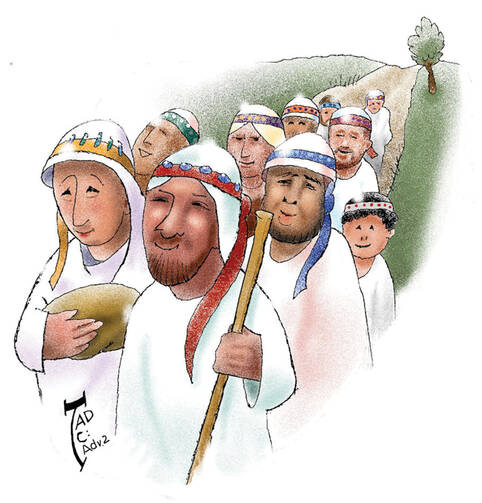Today's Gospel: Preparing the People of God
Preparation for the coming of the Lord is not simply an individual task, though it incorporates personal holiness and love, but there is most prominently an ecclesial dimension, in which the whole people of God await Christ’s parousia so that they might return home to the Promised Land, the kingdom of God. To prepare, we wait for what God will do for us and we act to make God known to the world around us.
The text of Baruch, set in the return from the Babylonian exile, presents Israel on a pilgrimage home directed by God. The prophet speaks for God (5:5) and says:
Led away on foot by their enemies they left you:
but God will bring them back to you
carried high in glory as on royal thrones.
God shines forth in the people of God, who, Baruch says, wear “the cloak of justice” and “the mitre that displays the glory of the eternal name.”
John the Baptist presents for us the task of the people of God in response to the coming of the Messiah and the eschatological pilgrimage. John began to tell the people to prepare with “a baptism of repentance for the forgiveness of sins.” As with Baruch, John presents an image of the mountains and valleys being made flat and smooth as a sign of Israel’s repentance and moral transformation. This moral leveling allows Israel to “walk safely in the glory of God” and also allows “all flesh” to see God’s salvation.
For John’s public proclamation of preparation for the coming of the Lord has not just a corporate dimension for the people of God, but a universal dimension, in which all humanity is being prepared for the coming of God’s Messiah. When John shouts out, “Prepare the way of the Lord,” it is a corporate command, an imperative verb in the second person plural: “You all prepare the way of the Lord!” This is not just the work of a prophet specially chosen, but a means by which all the people can witness to the glory of God’s coming.
It is in the people of God that God’s splendor and righteousness should be seen, that the preparation for God’s presence is made manifest. Paul thanks the Philippians for “sharing in the Gospel from the first day until now” and stresses that there is work the church must do and that God will perfect. As with Israel being brought back by God from exile, Paul says that “the one who began a good work among you will bring it to completion by the day of Jesus Christ.” God will make us ready for the eschatological pilgrimage, but Paul encourages the Philippians, and us, in our own role in this preparation.
Paul tells the church that his prayer for them is that “your love may overflow more and more with knowledge and full insight.”
This is a remarkable prayer, though simple in many ways. Paul, like John the Baptist and Baruch, is speaking to the whole people of God, for “your” is plural; it is “the love (agapê) of you all,” and it is love that must be shown as a body and as individuals. Equally fascinating is how Paul connects self-sacrificial love to knowledge (epignôsis) and insight (aisthêsis). “Knowledge” (epignôsis) of this sort is often understood in the Greek sense as knowledge of divine things, connected to intellectual perception, while “insight” (aisthêsis) was understood by Stoic philosophers as arising from experience or the physical processes responsible for sense-perception. Love, that is, is not simply emotions running wild but is grounded in our knowledge of the truth of God and of the world around us.
Our work in preparation for the coming of God, Paul says, is to increase in love as the people of God, “to determine what is best so that in the day of Christ you [plural] may be pure and blameless.” And this preparation of love is so that we might direct all to their true home, to be ready at the coming of Jesus Christ, to join with them on the pilgrimage to the kingdom of God.
This article also appeared in print, under the headline “Preparing the People of God ,” in the November 30, 2015, issue.








